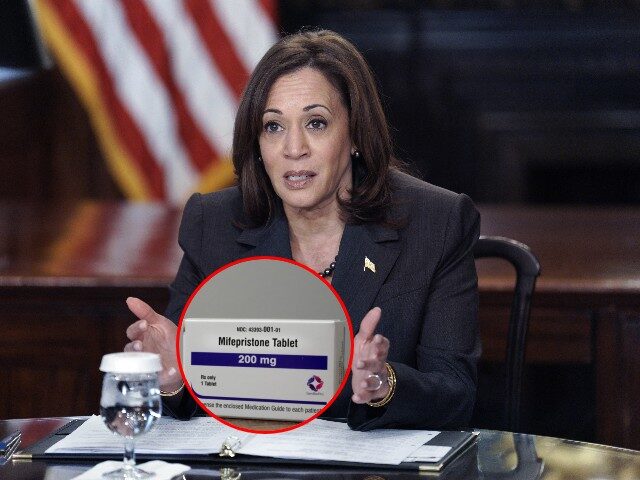Vice President Kamala Harris on Friday claimed that a lawsuit challenging the U.S. Food and Drug Administration’s (FDA) approval of mifepristone, the first of two drugs used in a medication abortion, is an “attack on the very foundation of our public health system.”
“There are now partisan and political attacks attempting to question the legitimacy of a group of scientists and doctors who have studied the significance of this drug,” Harris said, according to Axios. “This is not just an attack on women’s fundamental freedoms. It is an attack on the very foundation of our public health system.”
Ahead of a meeting with pro-abortion leaders, Harris said the FDA’s review of the abortion pill was a “strenuous, peer-reviewed process determining it is safe.” She also stated that those siding against the FDA “ought to look in their medicine cabinets to figure out whether they’re prepared to say that those medications that they need to alleviate suffering and to prolong their quality of life should no longer be available to them — because that is what we are talking about.”
The vice president’s comments come ahead of a ruling in the case, which could be released as soon as Friday. The Alliance Defending Freedom (ADF) filed the lawsuit in the U.S. District Court for the North District of Texas in November 2022 against the FDA on behalf of four national medical associations and several doctors, alleging that the agency “chose politics over science and approved chemical abortion drugs for use in the United States.” The lawsuit points to six discrete agency actions since the legalization of mifepristone and misoprostol in 2000 and asks the court to hold the actions unlawful, which would ultimately take mifepristone off the market.
The complaint alleges that the “only way” the agency could have approved chemical abortion drugs “was to use its accelerated drug approval authority, necessitating that FDA call pregnancy an ‘illness’ and argue that these dangerous drugs provide a ‘meaningful therapeutic benefit’ over existing treatments.”
“But pregnancy is not an illness, nor do chemical abortion drugs provide a therapeutic benefit over surgical abortion. In asserting these transparently false conclusions, the FDA exceeded its regulatory authority to approve the drugs,” the ADF asserts.
The ADF further alleges that the FDA never studied the safety of mifepristone under the labeled conditions of use, ignored the potential impacts of the hormone-blocking regimen on the developing bodies of adolescent girls, disregarded evidence that chemical abortion drugs cause more complications than surgical abortion, and eliminated necessary safeguards for pregnant girls and women who take the regimen.

In this photo illustration, a person looks at an Abortion Pill (RU-486) for unintended pregnancy from Mifepristone displayed on a smartphone on May 8, 2020, in Arlington, Virginia (OLIVIER DOULIERY/AFP via Getty Images).
The lawsuit then details that, in 2016, the FDA extended the permissible gestational age of the baby for which a girl or woman may take the abortion drugs —from seven weeks gestation to ten weeks gestation. Then in 2019, the FDA allegedly approved a generic version of the drug “without requiring any new clinical investigations or studies that evaluated the drug’s safety and effectiveness under the requirements” under several laws, according to the complaint.
In 2021, the FDA then allowed abortionists to send mifepristone through the mail, which the ADF says was “in direct violation of federal law.” The FDA recently made permanent its rule to allow women and girls to receive a prescription for mifepristone via telemedicine. The complaint alleges:
All of the FDA’s actions on chemical abortion drugs—the 2000 approval, the 2016 major changes, the 2019 generic drug approval, and the two 2021 actions to eliminate the in-person dispensing requirement—failed to acknowledge and address the federal laws that prohibit the distribution of chemical abortion drugs by postal mail, express company, or common carrier. Instead, the FDA’s actions permitted and sometimes even encouraged these illegal activities.
The FDA filed in opposition to the motion for preliminary injunction on January 13, 2023, calling plaintiffs’ request “extraordinary and unprecedented.” The reply reads:
Plaintiffs have pointed to no case, and the government has been unable to locate any example, where a court has second-guessed FDA’s safety and efficacy determination and ordered a widely available FDA-approved drug to be removed from the market—much less an example that includes a two-decade delay. Nor have Plaintiffs identified any instance in which a court has entered a preliminary injunction suspending or withdrawing approval of a widely available drug on any other ground.
The FDA claims that the issuance of a preliminary injunction would “cause significant harm” and deprive patients of “a safe and effective drug that has been on the market for more than two decades.”
Mifepristone is used for more than half of all abortions in the United States. In 2020, the drug accounted for 53 percent of all abortions, up from 39 percent in 2017, the pro-abortion Guttmacher Institute found.
The case is Alliance for Hippocratic Medicine v. U.S. Food and Drug Administration, No. 2:22-cv-223, in the U.S. District Court for the Northern District of Texas.

COMMENTS
Please let us know if you're having issues with commenting.